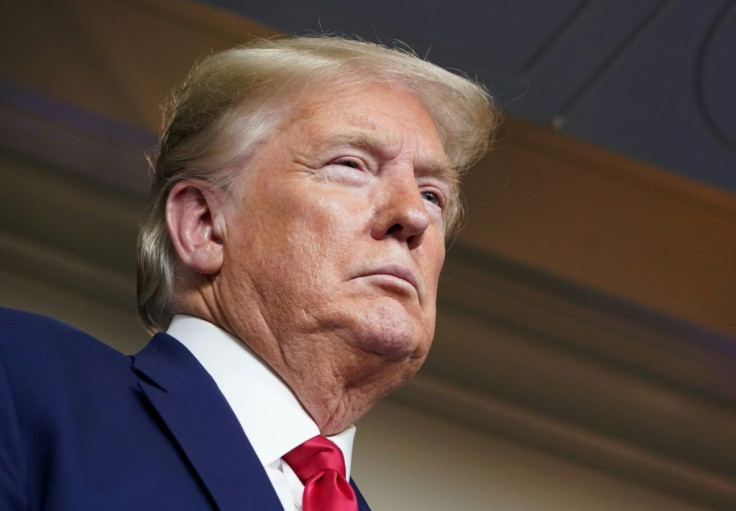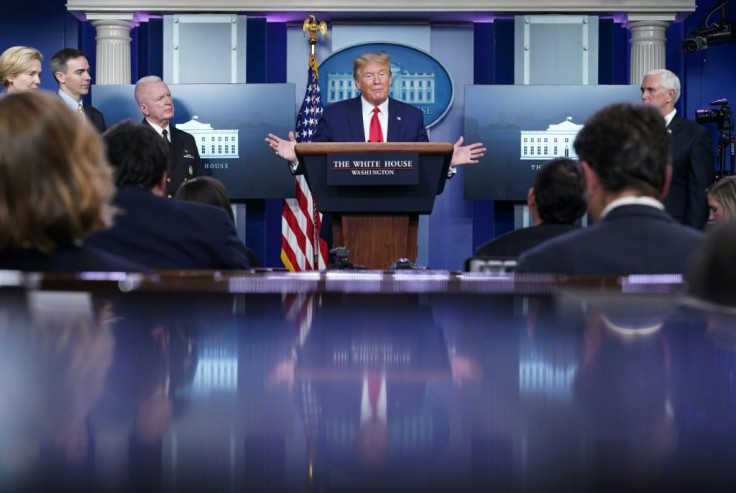As Virus Crisis Swirls, Trump Puts Immigration Front And Center

The United States is still battling coronavirus, but with six months to go before he faces re-election, President Donald Trump has shifted gears to put immigration -- a bread-and-butter issue for his supporters -- atop the agenda.
His surprising announcement late Monday that he would move to suspend all immigration into the country is a risky strategy that could backfire -- should he end up accused of using the pandemic to score points on a controversial issue.
After all, the world's largest economy is staring down the barrel of a prolonged nationwide crisis -- 22 million Americans have filed for unemployment in recent weeks.
But Trump is comfortable with his unique style of politics, making a vague but major announcement on Twitter, knowing it will galvanize his base and create headlines.
"In light of the attack from the Invisible Enemy, as well as the need to protect the jobs of our GREAT American Citizens, I will be signing an Executive Order to temporarily suspend immigration into the United States!" he wrote.
The statement was certainly light on detail, and the White House did not offer any more specifics Tuesday, either on the timetable or how the policy would be implemented.
To curb the spread of the deadly contagion, Trump placed restrictions on travel between the US and China in January, and eventually barred foreigners from traveling between the US and most of Europe.
But the tweet on Monday from the real estate mogul-turned-world leader -- a relentless champion of the need to squelch illegal immigration -- went a step farther.
It implies that the Republican president simply wants to shut down any legal immigration into the United States for an unspecified period of time.
In other words, the government would stop issuing work visas or residency permits (green cards) to any foreigners wishing to come live in the country.
According to US officials who spoke on condition of anonymity to The Wall Street Journal, the eventual executive order could include exceptions for farm and health care workers.
The US government issued 462,000 visas in fiscal 2019, according to official data -- a major drop from the 617,000 visas granted in 2016 under Trump's predecessor Barack Obama.

Even raising the specter of an executive order on immigration, which would likely face immediate opposition in court, raised hackles among Trump's Democratic opponents.
Texas lawmaker Joaquin Castro slammed what he called "an attempt to divert attention away from Trump's failure to stop the spread of the coronavirus and save lives."
In a tweet, Castro accused Trump of "an authoritarian-like move to take advantage of a crisis and advance his anti-immigrant agenda."
Fellow Democrat Jerry Nadler -- a longtime Trump foe -- hit out at the president for using immigrants as scapegoats for the current crisis.
"The truth is many immigrants are on our front lines, protecting us as doctors, nurses, health aides, farmworkers, and restaurant workers," Nadler said.
If, as is likely, the debate shifts to the courts, it will be closely followed.
The Supreme Court has in recent months offered several significant victories to the Trump administration in cases relating to immigration.
A month ago, the high court allowed the federal government to maintain a policy that will send more than 60,000 asylum seekers back to Mexico.
The "Remain in Mexico" policy unveiled in December 2018 and implemented a month later calls for non-Mexican asylum seekers who attempt to enter the US via that country to stay there while their cases are being decided.
In a bit of further proof -- if any were needed -- that Trump is focused on the November 3 election, his Tuesday morning tweets focused on his approval rating and his 2016 victory at the polls.
"It is amazing that I became President of the United States with such a totally corrupt and dishonest Lamestream Media going after me all day, and all night," he said.
"Either I'm really good, far better than the Fake News wants to admit, or they don't have nearly the power as once thought!"
© Copyright AFP {{Year}}. All rights reserved.





















